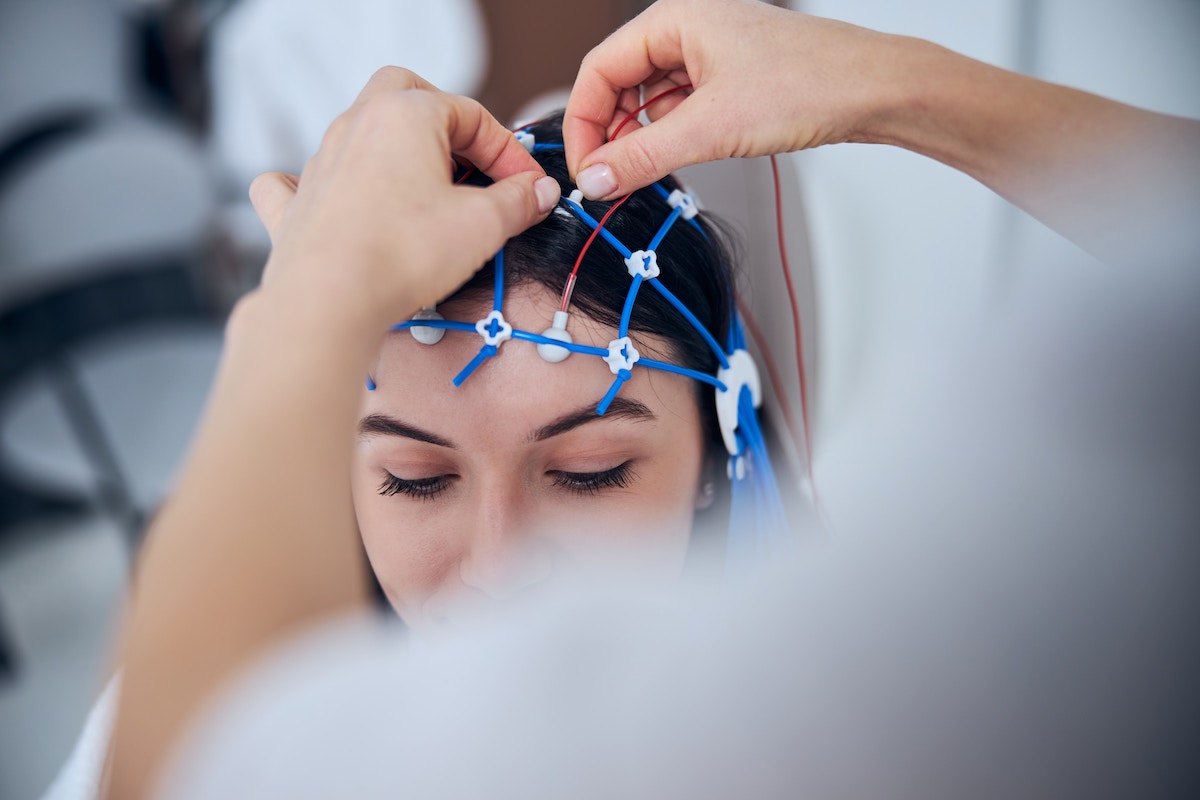
Neurofeedback
We are excited to bring Neurofeedback to Park Cities and the surrounding Dallas areas!
The Benefits of Neurofeedback
There are several benefits to Neurofeedback. First, not only is it effective, but it has a positive and long-term outcome after going through approximately 30 to 40 sessions. Second, it is non-invasive and non-pharmaceutical. It is also a treatment modality that has been used for decades and has scientific research backing its use. This treatment has shown great success for patients suffering from ADHD, sleep disorders, and other mental health conditions. Benefits achieved through Neurofeedback include:
- Improved sleep
- More energy and motivation
- Improved concentration
- Improved focus
- More relaxed and calm
- Improvement in overall mood
- Reduces/eliminates the need for pharmaceuticals
What is Neurofeedback?
Neurofeedback is a treatment modality that offers a solution for patients wanting an alternative treatment other than medications.
It is a way of training an individual’s brain waves to respond to the individual’s own unique brain wave activity by the use of biofeedback. It addresses disorders of the brain by moderating brainwaves, thus alleviating symptoms of conditions like ADHD or Sleep Disorders.
Neurofeedback training has been used in clinical settings for over 50 years and is backed by numerous scientific studies as being effective in treating certain brain and central nervous system disorders.
What makes Neurofeedback unique to each individual is that each patient undergoes a qEEG, or a “brain mapping” session before beginning their treatment, so that treatment is tailored specifically for the patient based on their own brain wave patterns. It is not a one-size-fits-all approach, which makes it significantly more effective in treating disorders of the brain and central nervous system.
Contact our New Patient Coordinator
for more information. Or fill out the form below.
Once a patient goes through their scheduled number of sessions, the effects of the treatment are long-lasting, and because symptoms are alleviated, the need for medications is usually eliminated or significantly decreased.
There are no contraindications for anyone wishing to undergo Neurofeedback training.
We Use the Most Technologically Advanced Equipment
At Brain Treatment Center Dallas, the Neurofeedback that we offer is the NeuroGuide 19 Channel. There are different systems out there that offer a different number of channels, however, those usually result in a more narrow training. Ours is one of the most updated systems available. It offers more visibility to be brain, allows a 3D image to be generated, and you can see the brain connections being made. It’s overall more comprehensive and allows for more in-depth reporting and more ways to train.
A Neurofeedback session consists of what your brain should be doing and comparing it to what it is actually doing. A typical appointment uses a computer screen and is in the form of a video game, movie, or music. Because you will be wearing the EEG cap and the movie or video game plays, it is because you are approaching your brain’s desired state. When it stops, it means your brain is going in a different direction than the task at hand. Over time, your brain is “trained” to stay focused, relax, etc., so that it will automatically stay this way without the Neurofeedback training.
What is a qEEG (quantitative electroencephalography)
A qEEG, or “Brain Map” is a painless assessment of the patient’s brain waves. The qEEG/brain map is the core of our evaluation and identifies brain dysregulation so that an individualized treatment plan can be customized for each person.
It involves the use of a rubber cap placed on the head so that brain wave activity can be measured. The qEEG measures brain waves and activity at 19 different locations on the scalp. It also shows how brain waves at one location communicate with those at other locations providing an accurate measure of power, consistency, and speed. It is used to provide data about how YOUR brain supports emotions and cognitive abilities and allows us to design a method to “train” your brain.
The qEEG measures the activity of all of the brain waves and compares them to a large database of what “normal” brain waves are supposed to look like. If brain waves of any category are abnormal, this causes dysregulation which translates into symptoms that you may be experiencing such as hyperactivity, inability to focus, inability to relax, and more. For example, too much Theta wave activity can indicate that a patient has ADHD. Another example is that if a person has too much Beta wave activity, this can cause issues such as anxiety or the inability to relax.
Protocols for NeuroFeedback
After undergoing your qEEG, we will be able to begin your treatment protocol. You will have an additional debriefing appointment approximately one week later, and then again at the end of your entire treatment process.

Conditions Treated
While NeuroFeedback can be used to treat a variety of disorders associated with the brain and central nervous system, here at the Brain Treatment Center Dallas, we use the protocol to treat persons with ADHD, Sleeping Disorders, and for those who want to improve their focus and calm their minds.
We treat patients with these conditions who are 8 years and older.

Neurofeedback First Step
The first appointment will be your qEEG/Brain mapping appointment which will last from an hour and a half to two hours. The qEEG does involve the use of a rubber cap with 19 leads to be placed on your head and will involve sessions of recording which require you to close your eyes some of the time and keep them open for others while the qEEG is recording your brain waves. This is a completely painless test, and Kristen will be with you the entire time to guide you through the process

NeuroFeedback 2nd Step
The second step in the NeuroFeedback process is to have a clinical consultation with Kristen Elliott, our board-certified Neurofeedback Director at the Brain Treatment Center. This appointment usually takes about 45 minutes. She will go over the NeuroFeedback process, what to expect during a typical treatment plan, and help you determine if this is a recommended plan for you or your child based on your health needs and goals.
The important thing to remember is that NeuroFeedback training is cumulative, with each session building on the last so your participation and commitment are required for the overall success of your therapy.
Contact our New Patient Coordinator
for more information. Or fill out the form below.
NeuroFeedback — How it Works
Your Neurofeedback training sessions generally last from 45 minutes to 1 hour, and it is recommended that you attend your sessions twice a week to get the most out of your training.
Additionally, we require that you complete at least 20 training sessions with us. This is considered an “assessment period,” and you should start to realize some benefits of the NeuroFeedback at the end of this time period. In most cases, for the best and long-lasting results, it will take 30 to 40 sessions to complete your NeuroFeedback therapy.
If you are taking medications for your specific condition, it is advised that you keep your prescribing provider apprised of your progress, since in most cases, you will need less medication as you go through the NeuroFeedback training. It is extremely important that you advise us of all of the medications that you are taking before beginning your treatment protocols as well.
Your technician will be with you during your training sessions, and you will wear an EEG cap at each training session which will be plugged into the screen that you are watching. As you are able to follow the instructions on the screen, the system will “reward” you. If your attention starts to wane, the system will slow its operation or stop altogether, thus helping to “train your brain.” What makes this particularly effective is that YOU control what happens during your training session, and you will also be able to see the results in real-time.
Side Effects of NeuroFeedback
Patients may experience some side effects after going through a NeuroFeedback training session, but they are generally mild and last only a few hours. Side effects may include:
- Mild headache
- Fatigue
- Irritability
- Agitation
- Impaired focus
- Heightened anxiety
These types of side effects are normal for patients going through any types of treatment that modulate the brain waves, and will generally lessen as the patient goes through more sessions.
Are you a candidate for NeuroFeedback?
If you are having problems focusing, if you experience hyperactivity, or have trouble relaxing and sleeping, then NeuroFeedback can be a very effective means of treatment for you. As you progress through your treatment sessions you will usually start to feel calmer at first, and then more focused as training continues.
You will start to notice a difference in your behavior and thought patterns in as little as 5 or 6 sessions. As you complete more sessions, you will notice that these benefits will last for a day or two. After about 20 sessions, benefits should last a week or more. After completing your recommended amount of training sessions specifically for your condition and individual case, treatment is long-lasting, and the need for medications drastically decreases or is eliminated altogether.
Guidelines and Recommendations for NeuroFeedback Training
While there are no contraindications for undergoing NeuroFeedback, there are things that can decrease its effectiveness, or the ability to get a clean qEEG. Based on this, we recommend the following:
- Disclose all medications that you are taking.
- Do not use alcohol or marijuana within 24 hours of qEEG appointment
- Do not use excessive caffeine in the 3-4 hours prior to qEEG, and do not have a cigarette (if you smoke) within one hour of qEEG.
- In preparation for making good connections with the scalp during qEEG and training sessions, please do not use hair gels, sprays, baby shampoos, or medical shampoos.
- Eat a high-protein snack prior to your qEEG and prior to your training sessions, however, try to avoid turkey since this may interfere with your energy levels.
- Avoid sweets or processed foods prior to qEEG and training sessions
- Do NOT use street drugs or marijuana while undergoing training as they will interfere with progress by as much as 50%.
- Limit alcohol intake throughout treatment duration and do not drink on days of training sessions as alcohol can negatively affect sleep and slow down training progress.
- Please advise of your complete medical history along with any symptoms that you are experiencing on your intake paperwork.
Neurologist Dr. Spencer O. Miller is the owner and Medical Director of the Brain Treatment Center Dallas and oversees the Neurofeedback treatments.
About Us
Spencer O. Miller, M.D. is a Board-Certified Neurologist
Spencer O. Miller, M.D. is a Board-Certified Neurologist in Dallas, Texas. He received his medical degree from the University of Mississippi School of Medicine and has been in practice for 13 years, 5 of which were in the USAF, where he saw all types of brain injuries, including soldiers suffering from PTSD and TBI. He specializes in the treatment of ADHD, sleep disorders, traumatic brain injury, depression, post-traumatic stress disorder, dementia, autism, and multiple other brain disorders at his clinic, the Brain Treatment Center Dallas.
Dr. Miller and his talented team members are among the top in their field. They will do everything possible to achieve exceptional results for you. The entire team here at the Brain Treatment Center Dallas is extremely excited about the results we have been seeing with NeuroFeedback treatments.
Our clinic offers MeRT ® (Magnetic e-Resonance Therapy) for conditions such as depression, autism, post-traumatic stress disorder, traumatic brain injury, dementia, and brain complication after-effects of COVID-19. We offer NeuroFeedback for those suffering from ADHD and Sleep Disorders.
Our Philosophy: We explore the concept that the brain can be treated by physical means that are not chemical. We believe that with the exploration of the relationship between cognition and neural activity, an innovative and informed approach to non-invasive neuromodulation is possible. Our dedicated team believes in delivering individualized treatment in order to achieve a healthier life.
Kristen Elliott, MA, BCPCC, BCN, IM-C
Board-certified in NeuroFeedback, Kristen is our Neurofeedback Clinical Director here at the Brain Treatment Center Dallas. She is also a brain health coach. Kristen received her degree in psychology at Colorado State University in 2007, and her master’s degree in counseling from Southwestern Baptist Theological Seminary in 2011. Before arriving at The Brain Treatment Center Dallas, Kristen was at a private practice in Fort Worth for the last 10 years where she served clients suffering from ADHD, depression, anxiety, mTBI, and autism, using an integrated model of qEEG-guided NeuroFeedback, faith-based counseling, and brain health coaching. Kristen is excited to be part of the team at Brain Treatment Center Dallas! During her free time, Kristen enjoys spending time with her husband, family, and friends, serving in youth ministry, and adventuring in outdoor activities.
Contact our New Patient Coordinator for More Information about MeRT
When many patients come to see us, they have lost hope, as they don’t see any light at the end of the tunnel.
It’s rewarding as a practitioner to help so many people realize a much better “normal” and improved quality of life.
If you have questions or would like to discuss our treatment protocols, we offer a free consultation by phone.
Our New Patient Coordinator will take the time to listen and explain. She is able to answer most questions and discuss our protocols, scheduling, fees, and other information. She is happy to assist you in any way she can.
Please call us to get more information about how our clinic and Dr. Miller may help you with your health goals and to schedule an initial screening to see if NeuroFeedback may be an option.
Call our New Patient Coordinator at
214-225-1657
Or fill in the form below, and we will contact you.
Insurance Coverage
Unfortunately, we do not accept insurance, nor file it on your behalf. However, we can provide you with CPT codes and a billing breakdown that you may submit to your insurance for possible reimbursement. On occasion, individuals have been successful in receiving reimbursement for EEGs and clinical evaluations, and possibly other elements for treatment, depending on the individual’s coverage. It has been our experience that Medicare does not reimburse any of the treatment costs.

Contact Us